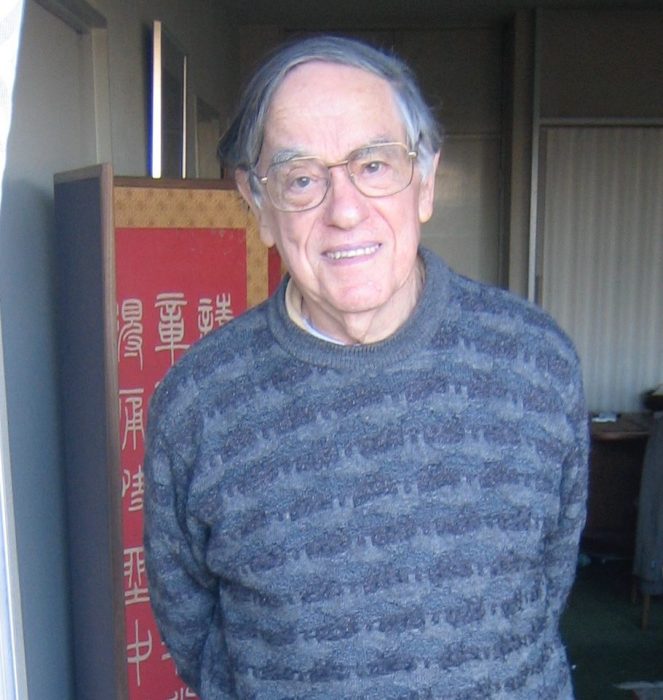
Words to Live by: Scholar of Japanese literature Donald Keene
Professor Donald Keene interviewed by Judit Kawaguchi in 2005 in Tokyo.
I forget that I am not Japanese. I don’t feel myself a stranger here but then someone asks me if I can eat sashimi and I feel shocked like a Japanese would. Of course most Japanese don’t know that Emperor Meiji never ate sashimi because he disliked it immensely.
I started Japanese because the feeling of discovery was so great. I could count the people in the English speaking world who knew Japanese and that excited me. I also discovered that I liked the company of Japanese people.
I came to Japan because I didn’t want to be stuck with a subject like The reputation of Chaucer in Spain. I studied French but sooner or later I would have had to choose a topic like that because even by then there were too many scholars of French literature.
I am a missionary of Japanese culture. I propagate it in the West to people who might have never heard of anything Japanese. I believe that it could be an important part of their life.
The sooner you begin learning languages, the better. Growing up with two or three languages must be very good. Unfortunately we were too poor to hire a private tutor for me so I only began studying French in junior high school, and followed it with Spanish, Classical Greek, Latin, German, Mandarin and Japanese.
Aristotle was wrong and Chikamatsu right: tragedy and great love affairs could happen even to anyone. Aristotle said in the “Poetics” that the hero of a tragedy must be a person of higher social status than ourselves, otherwise we think this is a poor, hopeless individual. But Chikamatsu recognized that even people with low social status have strong emotions and those are just as pure and important as a prince’s feelings.
People sometimes take the easy way out. They might say that the reason they don’t know Japanese literature is because it is so strange, so foreign, so unlike their own. That is such a disgraceful thing to say because if you are a cultured human being, you should be aware of other cultures, not only your own.
Some Americans love seeing their own country abroad. They travel and feel so happy to see a KFC in Peking or Moscow because for them it is evidence that American culture is widespread. Going abroad for this is such an unworthy purpose. They should try to learn about other countries.
For me there is constant stimulation in being in Japan. I ‘m a scholar of Japanese and being here I can learn something new everyday. Since 1946 I have not spent a single day without thinking of some aspect of Japan. No matter where I am.
Classics could be read in modern Japanese translation. Just read them!
The biggest danger ahead of the Japanese education is the loss of calligraphy, which will mean the loss of painting, too. People depend on the computer to supply them with characters they can not write anymore.
I realize that I am a foreigner when someone tries to make things easy for me. They might speak slower than usual, or might use simple words and then it hits me, that my face is not Japanese. Of course my friends don’t think of me as a Japanese or a foreigner, but as me. This is what I like.
I respond to works of art very much as a Japanese might. I love Japanese art.

I decided that I liked living by myself. I was involved in such a demanding study that things always got put off, and then I thought that after my PhD or my next book, would be the time to make a family. That day never came but I might still marry one day–who knows?
I’m not aware that I changed since, let’s say age 45, but I realize that people have another way of looking at me. Yesterday in a restaurant I wanted to go to the second floor, but the waitress said: “Oh, the stairs must be too much for you, so you had better sit on the first floor.” I recognized the goodwill there, but I was surprised because before her warning it didn’t occur to me that I was old. I feel the same when somebody gives me their seat on the train. Normally I stand and never feel it is unfair, as I feel young.
A good translation must be faithful to the original and it must read well in the language it is translated into. Attempts of making it sound foreign are bad, but some Japanese like it.
My biggest mistake in life is not keeping a diary, especially once I came here. I wish I had written one, describing my everyday experiences, what I saw, whom I met, what I ate, conversations I had.
Luckily, the Western perspective is much wider now. When I began teaching at Columbia University in 1955, I had to make my students understand Japan, so I compared its imperial court to that of Louis the 14th, but nowadays students are more likely to understand Japanese things than the court of Louis the 14th.
I am happy that history is not just European anymore. When I was a student in New York, we studied history, but it meant Europe’s only. We also had American history, but nothing about the rest of the world. Now kids read about others cultures, too.
Japanese may know more about foreign countries than about Japan. The education here tends in that direction. Some of this is natural–as if you are into economics, you will learn Western economics and not what the 17th century Japanese thought. But considering that Japan has 1000 years of great literature, this Westernized education system is nothing but a huge sacrifice.
Japanese should be proud of their wonderful stories. When kabuki first went to the US in the 60’s, members of the Japanese Diet said that no play should be shown if it contained feudal ideas or women of the licensed quarters. This eliminated almost the entire kabuki repertoire. I hope that today Japanese realize how silly this idea is.
Among the Japanese, the general attitude and basic assumption is that Japanese culture is too difficult so only the easy things like origami and dolls are sent abroad. In Brazil, people asked the Japanese government to send a group of Noh performers there to show one of Japan’s highest cultural forms, but the politicians here thought this was idiotic and replied that Takarazuka was better for the Brazilians. The Brazilians refused and insisted on Noh. The result was that they got both because the Japanese could not abandon the idea. Stop sending only the easy stuff!
I love the Japanese artistic sensitivity. I go to department stores to see the section where dishes are, and marvel at the variety of beautiful items, and the great number of artists who make a good living from pottery. It is just amazing, and it means the average Japanese has a sensitivity to beauty and is willing to spend money on these artistic items and support the potters.
Japanese talk about the weather because they love it! I enjoy Japanese letters describing the seasons. We Westerners only mention the weather when we have nothing better to talk about.
Japanese have a masochistic attitude. When a Japanese troupe performs abroad and two people from the audience leave, the media will focus on those two and not the hundreds who stayed.
The Japanese government should copy the French. The reason people love French culture is because the French government spent an awful amount of money on cultural exchanges.
People only see what their eyes are trained to see. When I give lectures, I am introduced as fluent in Japanese, but if I write a single kanji, the audience makes shocked sounds because they think no foreigner can ever master kanji. Americans are the opposite: they think everyone in the world speaks English, because to them, it is the world standard.
If the emphasis is on English, they will lose Japanese. It is inevitable. Unfortunately the direction is not towards gaining a good understanding of Japanese history, philosophy and literature. Japanese lost the ability to write beautiful characters already.
The Japanese are very flexible and love new gadgets. In New York educated people shun mobile phones, but here everyone uses them. They have no barrier for science and technology, so I am not surprised they are the world leaders in robot technology. Americans see robots as a tool for warfare, but the Japanese think of it as a cute companion. I prefer the Japanese way.
A version of this interview appeared in the Japan Times
http://www.japantimes.co.jp/life/2005/12/27/people/donald-keene/
This QuoteThe sooner you begin learning languages, the better. — Donald Keene